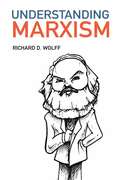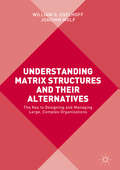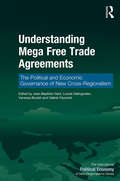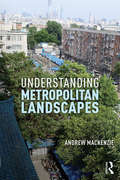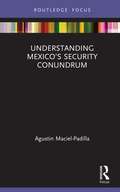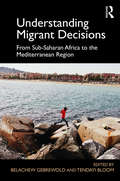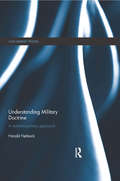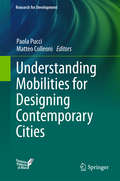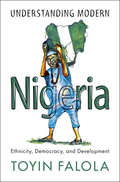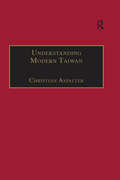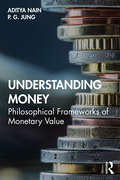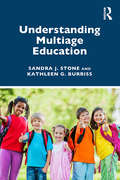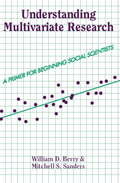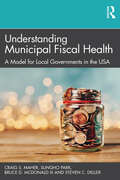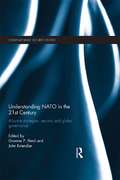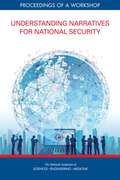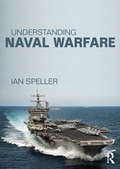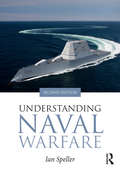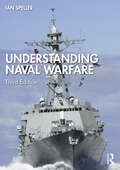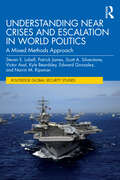- Table View
- List View
Understanding Marx: Flash
by Gill HandsThe books in this bite-sized new series contain no complicated techniques or tricky materials, making them ideal for the busy, the time-pressured or the merely curious. Understanding Marx is a short, simple and to-the-point guide to Marxism. In just 96 pages, the reader will learn all the key Marxist ideas and theories. Ideal for the busy, the time-pressured or the merely curious, Understanding Marx is a quick, no-effort way to break into this fascinating topic.
Understanding Marxism
by Richard D. WolffWhy should we pay attention to the great social critics like Marx? Americans especially now confront serious questions and evidences that our capitalist system is in trouble. It clearly serves the 1% far, far better than what it is doing to the vast mass of the people. Marx was a social critic for whom capitalism was not the end of human history. It was just the latest phase and badly needed the transition to something better. We offer this essay now because of the power and usefulness today of Marx’s criticism of the capitalist economic system.
Understanding Matrix Structures and their Alternatives
by William G. Egelhoff Joachim WolfThis book describes the use of matrix structures in large, complex organizations such as MNCs. Using an information-processing perspective of organization design, it develops a more comprehensive theory for fitting the structural configurations of matrix structures to key characteristics of firm strategy. Empirical research by the authors supports this theoretical framework. In addition to structural configuration, Understanding Matrix Structures identifies and develops the mode of decision making within a matrix as an important second dimension of matrix structure design. It can be either balanced (joint) decision making by the two dimensions of a matrix or rule-based decision making, where rules pre-assign certain decisions to one dimension or the other for unitary decision making. Recent exploratory research by the authors supports this conceptual framework and provides the potential to create a more flexible matrix structure- one that facilitates a more ambidextrous organization.
Understanding Mega Free Trade Agreements: The Political and Economic Governance of New Cross-Regionalism (The International Political Economy of New Regionalisms Series)
by Valérie Peyronel Jean-Baptiste Velut Louise Dalingwater Vanessa BoulletThe rise of cross-regional trade agreements is a defining trend of the current international trade system as shown by the signing of the Trans-Pacific Partnership (TPP) in 2015, the negotiations for the Transatlantic Trade and Investment Partnership (TTIP) between the USA and the EU as well as the Regional Comprehensive Economic Partnership (RCEP) between countries in Asia and Oceania. These differ from previous agreements in their economic significance and large geographic scale, and the wide scope of trade-related issues. The current rise of nationalist and isolationist ideologies across Europe and the USA has raised questions on the future of cross-regional trade deals and made the need to understand their implications for economic and political governance ever more urgent. Two main forms of governance that are central to this volume are the democratic tensions over new generation trade deals on the one hand, and their geopolitical ramifications on the other, which have come into collision to herald the advent of a highly uncertain period of world politics. Many of the questions tackled in this volume, surrounding the democratic governance of trade agreements – whether long-held debates on the inclusion of workers’ voices, controversies on intrusive "behind the border" provisions undermining national sovereignty and local autonomy or new questions on digital rights – are crucial to understand the ebbing popular support for far-reaching trade agreements. This book will be a useful learning tool for students and scholars in a wide range of fields, including Globalisation, Global Governance, International Political Economy, International Trade and Investment and International Law, and should also be of interest to EU trade negotiators, international policymakers and business associations.
Understanding Metropolitan Landscapes
by Andrew MacKenzieUnderstanding Metropolitan Landscapes considers and reflects on the fundamental relationships between metropolitan regions and their landscapes. It investigates how planning and policy help to protect, manage and enhance the landscapes that sustain our urban settlements. As global populations become more metropolitan, landscapes evolve to become increasingly dynamic and entropic; and the distinction between urban and non-urban is further fragmented and yet these spaces play an increasingly important role in sustainable development. This book opens a key critical discussion into the relational aspects of city and landscape and how each element shapes the boundaries of the other, covering topics such as material natures, governance systems, processes and policy. It presents a compendium of concepts and ideas that have emerged from landscape architecture, planning, and environmental policy and landscape management. Using a range of illustrated case studies, it provokes discussions on the major themes driving the growth of cities by exploring the underlying tensions around notions of sustainable settlement, climate change adaption, urban migration, new modes of governance and the role of landscape in policy and decision making at national, provincial and municipal levels.
Understanding Mexico’s Security Conundrum (Routledge Advances in International Relations and Global Politics)
by Agustin Maciel-PadillaUnlike other analyses which aim to explain the notion of national security in Mexico and at the same time address the security challenges facing the country, this short text describes the distinction between national, internal and public security in Mexico. It is the first book to provide detailed analysis on Mexico’s security policy and its long-term consequences. Former Mexican government official Augustin Maciel-Padilla contends that the absence of a clear understanding of the complexities and sophistication of the concept of security has the potential to aggravate security conditions in Mexico. Achieving a proper understanding allows for a better guidance in confronting the grave insecurity facing the country, and for addressing other issues such as human rights, democracy and the country’s international exposure. Maciel-Padilla reasons that Mexico is required to formulate a comprehensive, long-term, security strategy, and with this book he proposes a contribution towards that long-term goal. Understanding Mexico’s Security Conundrum will be essential for scholars, students, and policy makers.
Understanding Migrant Decisions: From Sub-Saharan Africa to the Mediterranean Region
by Belachew Gebrewold Tendayi BloomConsidering how changing conditions in the Mediterranean Region have affected the decisions of those considering migrating from Sub-Saharan Africa to or through the Region, this book represents an important and overdue contribution to international policy-making and academic discourse. In current discussions relating to this migration phenomenon, the complexity of individual decision-making are left unacknowledged and hence subsequent policy responses draw upon simplified models. In this volume, individual decision-making takes central stage by bringing together contributions demonstrating very different types of decision-making frameworks.
Understanding Military Doctrine: A Multidisciplinary Approach (Cass Military Studies)
by Harald HoibackThis book puts military doctrine into a wider perspective, drawing on military history, philosophy, and political science. Military doctrines are institutional beliefs about what works in war; given the trauma of 9/11 and the ensuing 'War on Terror', serious divergences over what the message of the 'new' military doctrine ought to be were expected around the world. However, such questions are often drowned in ferocious meta-doctrinal disagreements. What is a doctrine, after all? This book provides a theoretical understanding of such questions. Divided into three parts, the author investigates the historical roots of military doctrine and explores its growth and expansion until the present day, and goes on to analyse the main characteristics of a military doctrine. Using a multidisciplinary approach, the book concludes that doctrine can be utilized in three key ways: as a tool of command, as a tool of change, and as a tool of education. This book will be of much interest to students of military studies, civil-military relations, strategic studies, and war studies, as well as to students in professional military education.
Understanding Mobilities for Designing Contemporary Cities
by Paola Pucci Matteo ColleoniThis book explores mobilities as a key to understanding the practices that both frame and generate contemporary everyday life in the urban context. At the same time, it investigates the challenges arising from the interpretation of mobility as a socio-spatial phenomenon both in the social sciences and in urban studies. Leading sociologists, economists, urban planners and architects address the ways in which spatial mobilities contribute to producing diversified uses of the city and describe forms and rhythms of different life practices, including unexpected uses and conflicts. The individual sections of the book focus on the role of mobility in transforming contemporary cities; the consequences of interpreting mobility as a socio-spatial phenomenon for urban projects and policies; the conflicts and inequalities generated by the co-presence of different populations due to mobility and by the interests gathered around major mobility projects; and the use of new data and mapping of mobilities to enhance comprehension of cities. The theoretical discussion is complemented by references to practical experiences, helping readers gain a broader understanding of mobilities inrelation to the capacity to analyze, plan and design contemporary cities.
Understanding Modern Nigeria: Ethnicity, Democracy, and Development
by Toyin FalolaSince its independence from Britain in 1960, Nigeria has emerged as Africa's second largest economy and one of the biggest producers of oil in the world. Despite its economic success, however, there are deep divisions among its two hundred and fifty ethnic groups. Centered around three of the dominant themes of Nigeria's post-colonial narrative - ethnicity, democracy and governance, this is an accessible and comprehensive introduction to the history and events that have shaped these three areas. World-renowned expert in Nigerian history, Toyin Falola shows us how the British laid the foundations of modern Nigeria, with colonialism breading competition for resources and power and the widening cleavages between the Hausa-Fulani, Yoruba, and Igbo ethnic groups that had been forced together under British rule, the choice of federalism as a political system, and the religious and political pluralism that have shaped its institutions and practices. Using an examination of the outcomes of this history, manifested in hunger, violence, poverty, human rights violations, threats of secession and corruption, where power and resources are used to reproduce underdevelopment, Falola offers insights and recommendations for the future of policy and the potential for intervention in the country.
Understanding Modern Taiwan: Essays in Economics, Politics and Social Policy
by Christian AspalterFocusing on aspects of modern Taiwan related to the fields of economics, social policy and politics, this collection brings together leading scholars to discuss recent developments in Taiwanese society. The contributors discuss economic policy making in Taiwan, the Diaspora of Taiwanese businessmen, the issue of national identity, the factors behind political liberalization and democratization, labour and social politics, the emergence of social movements that promote new social policies, and the impact of democratization on welfare state politics in Taiwan. Since the lifting of martial law in 1987, Taiwan has undergone a period of rapid industrialization and democratization which has changed the face of Taiwanese society. This volume will provide an insight into these dramatic economic, political and societal changes.
Understanding Money: Philosophical Frameworks of Monetary Value
by P. G. Jung Aditya NainThis book offers a novel understanding of money by moving away from the dominant lens of economics through which it is usually seen. In contrast to the economic frameworks of "money", the volume examines philosophical discourses on money through conceptual frameworks that explain how monetary value manifests in various empirical monetary systems. It showcases how the increasingly abstract nature of the objects that stand proxy for money could be conceptualized ontologically, highlighting the predominance of digital money today, as well as contemporary monetary innovations such as cryptocurrencies like Bitcoin. Provocative, yet grounded in a sound theoretical framework, this book will be of interest to scholars, students, and teachers interested in money or monetary value, across various domains and disciplines such as philosophy, economics, sociology, anthropology, finance, science, and technology studies, as well as the interested general reader.
Understanding Multiage Education
by Sandra J. Stone Kathleen G. BurrissPresenting a compelling case for changing our system of education from a graded, curriculum-centered approach to a multiage, child-centered approach, Understanding Multiage Education is a comprehensive exploration of the philosophy and foundations of multiage education. Veteran educators Stone and Burriss examine the "why" of multiage education, exploring how multiage classrooms' structure, environment, strategies, and assessments unfold and complement the multiage philosophy and pedagogy. Delineating the differences between a standard and a mixed-age approach, each chapter features Inside Insights, short vignettes, case studies, examples of multiage in practice and discussion questions challenging readers to engage with the core concepts and examine how we might define success in a multiage classroom. Designed for graduate-level students of early childhood, elementary, and general education courses, as well as experienced practitioners, this is an essential guide for anyone interested in understanding the rationale, implementation, and benefits of multiage education.
Understanding Multinationals from Emerging Markets
by Ravi Ramamurti Alvaro Cuervo-CazurraWhy have relatively poor and underdeveloped countries been able to spawn so many global firms in the last two decades? Are emerging market multinationals (EMNCs) really different from successful multinationals from developed economies? This book tackles these and other fundamental theoretical questions about EMNCs. A distinguished group of researchers assesses the unique strategies and behavior of successful EMNCs, from the Chinese telecommunications firm Huawei to the Indian conglomerate Tata, to the South African beverages firm SABMiller. They address a range of topics, such as the drivers of internationalization by EMNCs; their distinctive process capabilities; how they catch up with established rivals on technology; how state ownership or business-group affiliation affects their behavior; and why they sometimes relocate their headquarters to advanced economies. This book will appeal to scholars and graduate students in global strategy and international business, as well as consultants of multinational companies, looking for state-of-the-art analysis of EMNCs.
Understanding Multivariate Research
by William Berry Mitchell SandersAlthough nearly all major social science departments offer graduate students training in quantitative methods, the typical sequencing of topics generally delays training in regression analysis and other multivariate techniques until a student’s second year. William Berry and Mitchell Sanders’sUnderstanding Multivariate Researchfills this gap with a concise introduction to regression analysis and other multivariate techniques. Their book is designed to give new graduate students a grasp of multivariate analysis sufficient to understand the basic elements of research relying on such analysis that they must read prior to their formal training in quantitative methods. Berry and Sanders effectively cover the techniques seen most commonly in social science journals--regression (including nonlinear and interactive models), logit, probit, and causal models/path analysis. The authors draw on illustrations from across the social sciences, including political science, sociology, marketing and higher education. All topics are developed without relying on the mathematical language of probability theory and statistical inference. Readers are assumed to have no background in descriptive or inferential statistics, and this makes the book highly accessible to students with no prior graduate course work.
Understanding Multivariate Research
by William Berry Mitchell SandersAlthough nearly all major social science departments offer graduate students training in quantitative methods, the typical sequencing of topics generally delays training in regression analysis and other multivariate techniques until a student's second year. William Berry and Mitchell Sanders's Understanding Multivariate Research fills this gap with a concise introduction to regression analysis and other multivariate techniques. Their book is designed to give new graduate students a grasp of multivariate analysis sufficient to understand the basic elements of research relying on such analysis that they must read prior to their formal training in quantitative methods. Berry and Sanders effectively cover the techniques seen most commonly in social science journals--regression (including nonlinear and interactive models), logit, probit, and causal models/path analysis. The authors draw on illustrations from across the social sciences, including political science, sociology, marketing and higher education. All topics are developed without relying on the mathematical language of probability theory and statistical inference. Readers are assumed to have no background in descriptive or inferential statistics, and this makes the book highly accessible to students with no prior graduate course work.
Understanding Multivariate Research
by William Berry Mitchell SandersAlthough nearly all major social science departments offer graduate students training in quantitative methods, the typical sequencing of topics generally delays training in regression analysis and other multivariate techniques until a student’s second year. William Berry and Mitchell Sanders’s Understanding Multivariate Research fills this gap with a concise introduction to regression analysis and other multivariate techniques. Their book is designed to give new graduate students a grasp of multivariate analysis sufficient to understand the basic elements of research relying on such analysis that they must read prior to their formal training in quantitative methods. Berry and Sanders effectively cover the techniques seen most commonly in social science journals--regression (including nonlinear and interactive models), logit, probit, and causal models/path analysis. The authors draw on illustrations from across the social sciences, including political science, sociology, marketing and higher education. All topics are developed without relying on the mathematical language of probability theory and statistical inference. Readers are assumed to have no background in descriptive or inferential statistics, and this makes the book highly accessible to students with no prior graduate course work.
Understanding Municipal Fiscal Health: A Model for Local Governments in the USA
by Steven C. Deller Bruce D. McDonald III Craig S. Maher Sungho ParkUnderstanding Municipal Fiscal Health provides an in-depth assessment of the fiscal health of cities throughout the United States. The book examines the tools currently available to cities for designing a revenue structure, measuring fiscal conditions and measuring fiscal health. It explains how artificial policies such as tax and expenditure limitations influence fiscal policies, and how communities can overcome socioeconomic and state-policy barriers to produce strong fiscal conditions. The authors go beyond simple theory to analyze patterns of fiscal health using actual financial, demographic and TEL data from an accurate data source, the Government Financial Officers Association survey. The book offers a solid basis of empirical evidence including quantitative case studies—complete with discussion questions—to help practitioners better understand the environment in which they are functioning and the policy tools they need to help advocate for change. This book teaches the reader the science and art of municipal financial analysis, and will be invaluable for local and state officials, analysts, and students and researchers.
Understanding NATO in the 21st Century: Alliance Strategies, Security and Global Governance (Contemporary Security Studies)
by John Kriendler Graeme HerdUnderstanding NATO in the 21st Century enhances existing strategic debates and clarifies thinking as to the direction and scope of NATO’s potential evolution in the 21st century. The book seeks to identify the possible contours and trade-offs embedded within a potential third "Transatlantic Bargain" in the context of a U.S. strategic pivot in a "Pacific Century". To that end, it explores the internal adaptation of the Alliance, evaluates the assimilation of NATO's erstwhile adversaries, and provides a focus on NATO’s operational future and insights into the new threats NATO faces and its responses. Each contribution follows a similar broad tripartite structure: an examination of the historical context in which the given issue or topic has evolved; an identification and characterization of key contemporary policy debates and drivers that shape current thinking; and, on that basis, a presentation of possible future strategic pathways or scenarios relating to the topic area. This book will appeal to students of NATO, international security and international relations in general.
Understanding Narratives for National Security: Proceedings Of A Workshop
by Engineering Medicine National Academies of SciencesBeginning in October 2017, the National Academies of Sciences, Engineering, and Medicine organized a set of workshops designed to gather information for the Decadal Survey of Social and Behavioral Sciences for Applications to National Security. The sixth workshop focused on understanding narratives for national security purposes, and this publication summarizes the presentations and discussions from this workshop.
Understanding National Identity
by McCrone, David and Bechhofer, Frank David Mccrone Frank BechhoferWe live in a world in which being a 'citizen' of a state and being a 'national' are by no means the same. Amidst much scholarly debate about 'nations' and 'nationalism', comparatively little has been written explicitly on 'national identity' and a great deal less is solidly evidence-based. This book focuses on national identity in England and Scotland. Using data collected over twenty years it asks: does national identity really matter to people? How does 'national identity' differ from 'nationality' and having a passport? Are there particular people and places which have ambiguous or contested national identities? What happens if someone makes a claim to a national identity? On what basis do others accept or reject the claim? Does national identity have much internal substance, or is it simply about defending group boundaries? How does national identity relate to politics and constitutional change?
Understanding Naval Warfare
by Ian SpellerThis new textbook offers the reader an accessible introduction to the study of modern naval warfare, providing a thorough grounding in the vocabulary, concepts, issues, debates and relevant history. Navies operate in an environment that most people do not understand and that many avoid. They are equipped with a bewildering range of ships, craft and other vessels and types of equipment whose purpose is often unclear. Writings on naval warfare are usually replete with references to obscure concepts explained in arcane language that can serve as an effective barrier to understanding. It is the objective of this book to cut through the obscure and the arcane to offer a clear, coherent and accessible guide to the key features of naval warfare that will equip the reader with the knowledge and understanding necessary for a sophisticated engagement with the subject. Understanding Naval Warfare is divided into two key parts. The first focuses on concepts of naval warfare and introduces readers to the key concepts and ideas associated with the theory and practice of naval operations. The second part focuses on the conduct of war at sea, and also on peacetime roles for contemporary navies. This section concludes with a chapter that looks ahead to the likely future of naval warfare, assessing whether navies are likely to be more or less useful than in the past. This textbook will be essential reading for students of naval warfare, seapower and maritime security, and highly recommended for students of military history, strategic studies and security studies in general.
Understanding Naval Warfare
by Ian SpellerThis new and updated edition of Understanding Naval Warfare offers the reader an accessible introduction to the study of modern naval warfare, providing a thorough grounding in the vocabulary, concepts, issues, and debates, set within the context of relevant history. Navies operate in an environment that most people do not understand and that many avoid. They are equipped with a bewildering range of ships, craft and other vessels and types of equipment, the purpose of which is often unclear. Writings on naval warfare are usually replete with references to esoteric concepts explained in specialist language than can serve as a barrier to understanding. The objective of this book, therefore, is to cut through the obscure and the arcane to offer a clear, coherent and accessible guide to the key features of naval warfare which will equip the reader with the knowledge and understanding necessary for a sophisticated engagement with the subject. This second edition is divided into two key parts. The first focuses on concepts of naval warfare and introduces readers to the ideas associated with the theory and practice of naval operations. It also includes a new chapter in which the history of the last century of naval warfare is explored in order to illustrate the key concepts. The second part focuses on the conduct of war at sea and on peacetime roles for contemporary navies. This latter section concludes with a chapter that looks ahead to the likely future of naval warfare. This textbook will be essential reading for students of naval warfare, sea power and maritime security, and highly recommended for those studying military history, strategic studies and security studies in general.
Understanding Naval Warfare
by Ian SpellerThis updated new edition of Understanding Naval Warfare offers the reader an accessible introduction to the study of modern naval warfare, providing a thorough grounding in the vocabulary, concepts, issues and debates, set within the context of relevant history. The third edition explains traditional concepts and explores current and emerging ideas concerning the theory and practice of naval warfare, relating these to recent events including Sino-American naval competition and the Russian-Ukraine War. Navies operate in an environment that most people do not understand and that many avoid. They are equipped with a bewildering range of ships, craft and other vessels and types of equipment, the purpose of which is often unclear. Writings on naval warfare are usually replete with references to esoteric concepts explained in specialist language that can serve as a barrier to understanding. This book cuts through the obscure and the arcane to offer a clear, coherent and accessible guide to the key features of naval warfare which will equip the reader with the knowledge and understanding necessary for a sophisticated engagement with the subject. The new edition is divided into two key parts. The first focuses on concepts of naval warfare and introduces readers to the ideas associated with the theory and practice of naval operations and includes a chapter where the history of the last century of naval warfare is explored in order to illustrate the key concepts. The second part focuses on the conduct of war at sea and on peacetime roles for contemporary navies and now includes new material on hybrid warfare and grey zone operations and on joint warfare, multi-domain operations and integrated deterrence within the context of evolving great power rivalry at sea. This textbook will be essential reading for students of naval warfare, sea power and maritime security and is highly recommended for those studying military history, strategic studies and security studies in general.
Understanding Near Crises and Escalation in World Politics: A Mixed Methods Approach (Routledge Global Security Studies)
by Edward Gonzalez Steven E. Lobell Patrick James Norrin M. Ripsman Victor Asal Kyle Beardsley Scott A. SilverstoneThis book introduces the near crisis phase of conflict and escalation.These time-sensitive disputes between states, and even with violent non-state actors, do not involve significant risk of military escalation, at least in the moment. Investigating how and why some near crises escalate, while others do not, requires an explanation of the different dynamics of international disputes and the policy tools that states and international institutions can employ. We ask an expanded set of questions about specific cases and general patterns of conflict behavior, such as: why did Israeli leaders respond to Hezbollah’s 2006 cross-border raid with escalation, resulting in the Second Lebanon War, while in previous instances the Israelis limited their retaliation? Why didn’t the 2015 Iranian Ballistic Missile Test or the 1995 Norwegian Black Brant Missile Launch escalate, while the 2009 North Korea Missile Movement and the 1995 Taiwan Straits dispute tipped into a full-blown crisis, and why did the 2008 Russia-Georgia conflict escalate from near crisis to war? We use primary sources and newly created data on near crises to answer these questions and others. The overall conclusion is that an ounce of prevention at the near crisis phase is worth a pound of cure in averting a full-blown crisis or war.This book will be of great interest to students of security studies, conflict studies, foreign policy, and international relations.

